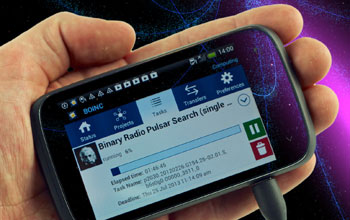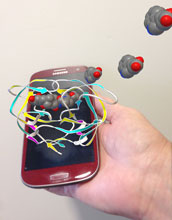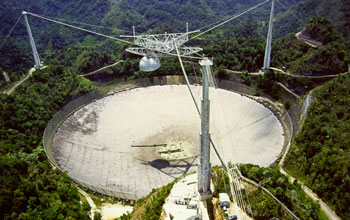All Images
News Release 13-130
Smartphones Become Even Smarter
The world's 900 million Android devices may now contribute to world-class research and discovery
This material is available primarily for archival purposes. Telephone numbers or other contact information may be out of date; please see current contact information at media contacts.

Today, for the first time, owners of Android-based smartphones and tablets can "donate" the surplus computing power of their devices to science; they can reach for the stars and discover new radio pulsars with Einstein@Home on their Android devices.
Credit: Max Planck Institute for Gravitational Physics/B. Knispel (photo), NASA (pulsar illustration)
Download the high-resolution JPG version of the image. (938 KB)
Use your mouse to right-click (Mac users may need to Ctrl-click) the link above and choose the option that will save the file or target to your computer.

Another project enabled for Android smartphones and tablets is FightAIDS@Home. The Olson Laboratory at the Scripps Research Institute is using computational methods to identify new candidate drugs that have the right shape and chemical characteristics to block HIV protease, HIV integrase, or HIV reverse transcriptase, the three enzymes that the deadly AIDS virus needs to function and spread.
Credit: Max Planck Institute for Gravitational Physics
Download the high-resolution JPG version of the image. (510 KB)
Use your mouse to right-click (Mac users may need to Ctrl-click) the link above and choose the option that will save the file or target to your computer.

Einstein@Home analyzes large amounts of data from the Arecibo Observatory in Puerto Rico, the world's largest and most sensitive single-dish radio telescope whose main purpose is to discover radio pulsars, rotating neutron stars that emit beams of electromagnetic radiation.
Credit: NSF
Download the high-resolution JPG version of the image. (3.6 MB)
Use your mouse to right-click (Mac users may need to Ctrl-click) the link above and choose the option that will save the file or target to your computer.
